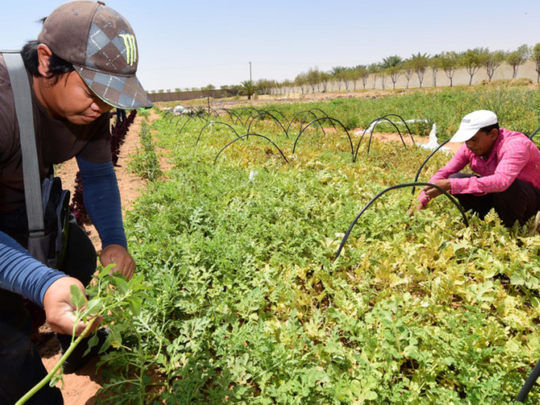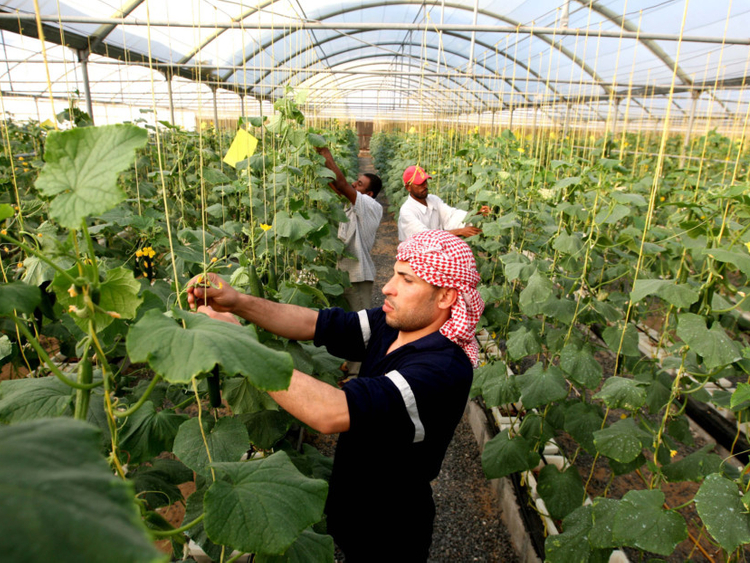
Dubai: Nurturing arid farmland to produce bountiful crops, come harvest time, is no easy task for even the best of food growers in the UAE.
But thanks to an annual farm assistance programme by the Ministry of Climate Change and Environment, UAE growers are being provided critical farming implements, seeds as well as fertilisers and pesticides at discounts of up to 50 per cent.
The federal government’s help is aimed at boosting UAE food security and improving the way of life for domestic farmers who need basic essentials for healthy harvests, said the ministry on Thursday.
Delivery of essential items to UAE farms will begin next week, said the ministry.
With an annual growth in food demand of above 12 per cent in the UAE and with roughly 64 per cent of all food being imported into the country every year, supporting local farmers to boost domestic produce is a high priority, said Dr Thani Ahmad Al Zeyoudi, Minister of Climate Change and Environment.
The ministry said it has commenced its annual financial and technical assistance drive to encourage sustainable, domestic agriculture practices following an annual survey to gauge the needs of farmers for the next growing season.
Sultan Alwan, assistant undersecretary of the Regions Sector, said in a statement on Thursday that his ministry “works relentlessly to support local agriculture and marketing of national agricultural products in order to implement the country’s food diversity strategy”.
“The ministry is committed to encouraging the adoption of modern agricultural practices, such as organic agriculture, and is keen to eliminate the challenges farmers face in their work,” Alwan said.
“In line with international best practices, MOCCAE leverages its effective partnerships with private sector companies to provide farmers with agricultural supplies, such as fertilisers, pesticides, seeds, irrigation pipes and soil testing equipment, for half of their market price. The suppliers deliver all materials purchased by the farmers from the ministry to the farm or to the nearest location in the vicinity of the farm.”
Based on the ministry’s meetings with farmers in different regions to study their actual requirements since 2016, the ministry will supply over 52 types of materials this year, indicating an increase of 40 per cent on last year.
“The distribution of agricultural materials and supplies for 2017 will begin next week. The materials include 9,500 tonnes of fertilisers, such as manure, hydroponic and organic fertilisers, as well as integrated pest management (IPM) supplies, such as low-impact insecticides and fungicides that are environmentally safe and suitable for aquatic agriculture, protected and organic farming,” the ministry said in a statement.
The ministry said it will also distribute up to five million seeds of the most common crops suitable for both protected and organic farming, such as tomatoes, cherry tomatoes, cucumbers and peppers. Materials for the construction of greenhouses, including polycarbonate sheets, thermal insulation and insect screens, hydroponic grow pads and cooling pads, and equipment such as irrigation pipes and pumps will also be available.
The programme mirrors calls in April of this year by Members of the Federal National Council (FNC) who demanded that more efforts be made to boost local food output and sustainability of farming activities to reduce reliance on imports.
The members called for initiatives to increase agricultural research funds, develop and invest in the hydroponic segment, as well as to reduce water usage though improved irrigation techniques and the provision of alternative sources of water.
Shaikh Mohammad Bin Abdullah Al Nuaimi, a member from Ajman, said the UAE’s food imports in 2015 reached Dh52 billion, while the food waste bill was Dh14 billion annually.
Farming assistance
Farmers can find more details about assistance by logging on to www.moccae.gov.ae
UAE first in Arab food security
Reports suggest that the UAE is ranked first in the Arab region when it comes to food security.
The Economist’s annual Global Food Security Index for 2015 ranked the level of food security in 109 countries. The criteria were based on food affordability and availability, in addition to the standard of quality and safety. The report revealed that the UAE ranked 23rd globally (with a score of 75.6) due to the country’s logistical infrastructure, high standards of food quality, large storage capacities and technologies, and a healthy domestic market.













